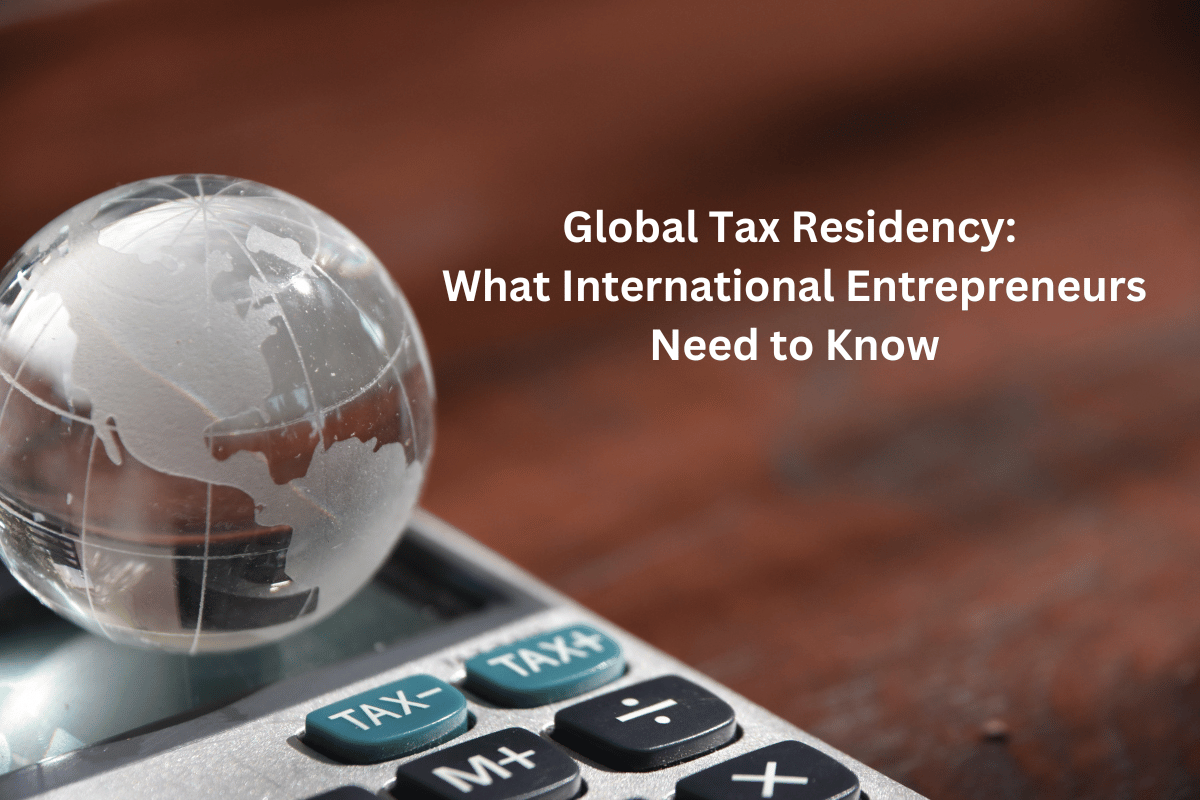Global Tax Residency: What International Entrepreneurs Need to Know
Global tax residency is key for international entrepreneurs as it determines where they pay tax on their income. Understanding tax residency is crucial for compliance with global tax laws and for minimizing tax liabilities which can make a big impact on business profitability. International tax planning is a crucial aspect for entrepreneurs to navigate these complexities effectively.
This article will cover:
- The 183-Day Rule: How this common threshold is used to determine tax residency and what it means.
- Tax Residency: What factors determine tax residency status, including time spent in a country, economic ties, and permanent home.
- U.S. Citizens and Green Card Holders: Special considerations and strategies for U.S. entrepreneurs abroad, including double taxation and U.S. tax compliance.
What is Tax Residency?
Tax residency refers to an individual or entity’s legal status within a jurisdiction for tax purposes. It determines where they pay tax, especially on global income.
The criteria for tax residency varies by country but often include:
- Physical presence in a country for a certain period of time (e.g. 183 days)
- Immigration status and permanent home
- Economic ties to a jurisdiction
- Central management and control, place of incorporation, and main business activities of the company
Understanding international tax law is essential for ensuring compliance and optimizing tax strategies on a global scale.
Global Tax Residency: What International Entrepreneurs Need to Know
Tax residency is important for entrepreneurs abroad for several reasons:
- Tax obligations: Tax residents are required to pay tax on worldwide income in the jurisdiction where they are resident, non-residents are taxed only on income sourced in that jurisdiction. Understanding tax residency helps entrepreneurs minimize tax liabilities by effectively navigating global tax laws.
- Compliance: Determining tax residency status ensures compliance with international tax laws and specific tax laws and filing requirements of each jurisdiction.
- Penalties: Failing to establish tax residency can result in penalties and double taxation if income is taxed in multiple countries.
- Tax planning: Knowing your tax residency status allows entrepreneurs to take advantage of tax treaty provisions and international tax strategies. Extensive knowledge of tax law is essential for providing tailored solutions and navigating complex tax regulations.
The 183-Day Rule: A Common Standard
The 183-day rule is a widely used threshold used by many countries to determine an individual’s tax residency status. It states that if an individual spends 183 days or more in a country in a tax year, they may be considered tax resident in that country and pay tax on their global income there. This rule significantly impacts income tax obligations, as some countries impose zero income tax on residents, making them attractive for expatriates and investors seeking favorable tax environments.
183-Day Rule Application
- Some countries add up the days, while others require 183 days of continuous stay.
- Economic ties, permanent homes, and center of life interests may also be considered in determining residency status.
- The U.S. has its own set of rules due to its citizenship-based taxation which can make things more complicated for expats and international entrepreneurs.
Exceptions and Variations
Note that the 183-day rule is just one of the tests used to determine tax residency. Countries may have other rules or exceptions that apply to the 183-day rule:
- In some countries like Germany, Italy, UK, Canada, New Zealand, and Australia, an individual can still be considered a tax resident if they spend less than 183 days in the country if they have strong economic ties or a permanent home there.
- Tax treaties between countries can also apply to the 183-day rule as they may have specific provisions for tax residency and double taxation.
Other Tax Residency Factors
Permanent Home
The location of an individual’s permanent home is a key factor in determining tax residency. If an individual has a permanent home in a country, they may be considered a tax resident in that country even if they spend less than 183 days there. A permanent home is a dwelling that is available for the individual’s use at all times.
Center of Life Interests
Center of life interests refers to where an individual’s personal and economic ties are strongest. This includes family location, social connections, and business interests. If an individual’s life interests are primarily in one country, they may be considered tax resident in that country even if they spend less than 183 days there.
Habitual Abode
Habitual abode considers the frequency and regularity of an individual’s stay in a country. If a person returns to a country frequently and has established a pattern of residence there, this can affect their tax residency status. Frequent and prolonged stays can indicate stronger ties to that country.
Double Tax Residency: Issues and Solutions
Double tax residency occurs when an individual is a tax resident in more than one country at the same time. This can happen when countries have different tests for tax residency, like the 183-day rule, permanent home, or strong economic ties to a jurisdiction. Understanding tax laws and leveraging double taxation agreements can provide significant tax benefits, optimizing tax situations for expats and global entrepreneurs.
Proper planning and strategic management are essential to minimize the tax burden associated with double tax residency, ensuring compliance and maintaining overall financial health.
Green Card Holders
Green card holders are U.S. permanent residents and are generally taxed on their worldwide income regardless of where they live. If a green card holder spends a significant amount of time outside the U.S. and becomes a tax resident in another country, they may face double tax residency issues. This is because the U.S. taxes green card holders based on their immigration status while the other country may consider them residents based on the number of days spent in the country or economic ties.
U.S. Citizens
U.S. citizens are also taxed on their worldwide income even if they live outside the U.S. This can lead to double tax residency if they become tax residents in another country based on the 183-day rule or permanent home. U.S. citizens are U.S. tax residents regardless of where they live or work.
Reducing Double Taxation
To reduce double taxation, countries enter into tax treaties that specify which country has the right to tax certain types of income. These treaties can also provide mechanisms for eliminating double taxation, such as a credit for taxes paid to the other country.
U.S. citizens and green card holders may be able to claim a foreign tax credit on their U.S. tax return for taxes paid to another country. This can reduce or eliminate their U.S. tax on income that was already taxed by the other country.
Your Tax Residency: A 5-Step Guide
Step 1: Check the 183-Day Rule
The 183-day rule is a common test for tax residency. It generally says if you spend 183 days or more in a country in a tax year, you may be a tax resident in that country. But the rules can vary, so check the 183-day rule in each country you have ties to.
Step 2: Evaluate Your Ties to Each Country
In addition to the 183-day rule, countries also consider:
- Permanent home: Where is your permanent home located?
- Center of life interests: Where are your strongest personal and economic ties, such as family, social connections, and business interests?
Step 3: Habitual Abode
The frequency and regularity of your visits to a country can also impact your tax residency. If you go back to a country frequently and have established a habit of residence there, this can be a stronger tie to that country.
Step 4: Ask Local Tax Authorities or a Tax Pro
If you’re not sure about your tax residency, contact the local tax authorities or a tax pro in each country you have ties to. They can advise based on your situation and the tax laws of that country.
Tools and Resources
- Residency calculators: Some countries have online tools to help you determine your tax residency based on the 183-day rule and other factors.
- Tax authority websites: Visit the websites of the tax authorities in each country to find information on tax residency requirements and the application process.
- Tax treaties: Check the tax treaties between countries, as they may have specific provisions on tax residency and double taxation.
U.S. Citizens and Green Card Holders
Tax Residency Regardless of Location
U.S. citizens and green card holders are taxed on their worldwide income regardless of where they live. This citizenship-based taxation can complicate their tax residency status as they may also be tax resident in the countries where they reside, leading to double taxation issues.
IRS Definition of Tax Home
The IRS defines tax home as the general area of your main place of business, employment or post of duty, regardless of where you maintain your family home. For U.S. persons living abroad, this means even if they live outside the U.S., their tax home is in the U.S. unless they meet specific criteria to establish a foreign tax home. This can affect their eligibility for deductions and credits for foreign-earned income and expenses.
Compliance Tips
To manage your tax obligations and stay compliant in both the U.S. and your country of residence, U.S. citizens and green card holders should:
- Stay Informed: Review U.S. tax laws and changes that may affect your filing requirements regularly.
- Use Exclusions and Credits: Use the Foreign Earned Income Exclusion (FEIE) and foreign tax credits to reduce your U.S. tax on foreign income.
- File on Time: File your U.S. tax returns on time to avoid penalties. Be aware of deadlines, especially if you’re in a different time zone.
- Consult Pros: Work with tax pros who specialize in expat tax services to navigate the complexities and stay compliant with U.S. and local tax laws.
Tax residency is important for international entrepreneurs as it determines where they have to pay taxes on their income. Key points covered are the 183-day rule, permanent home and center of vital interests, and the complexities for U.S. citizens and green card holders. Navigating these is key to avoiding double taxation and staying compliant with international tax laws.
We recommend you take action now to determine your tax residency. Review the rules in each country you operate in, assess your personal and economic ties, and consult with tax pros if needed to stay compliant and tax-optimized.
Sources:






